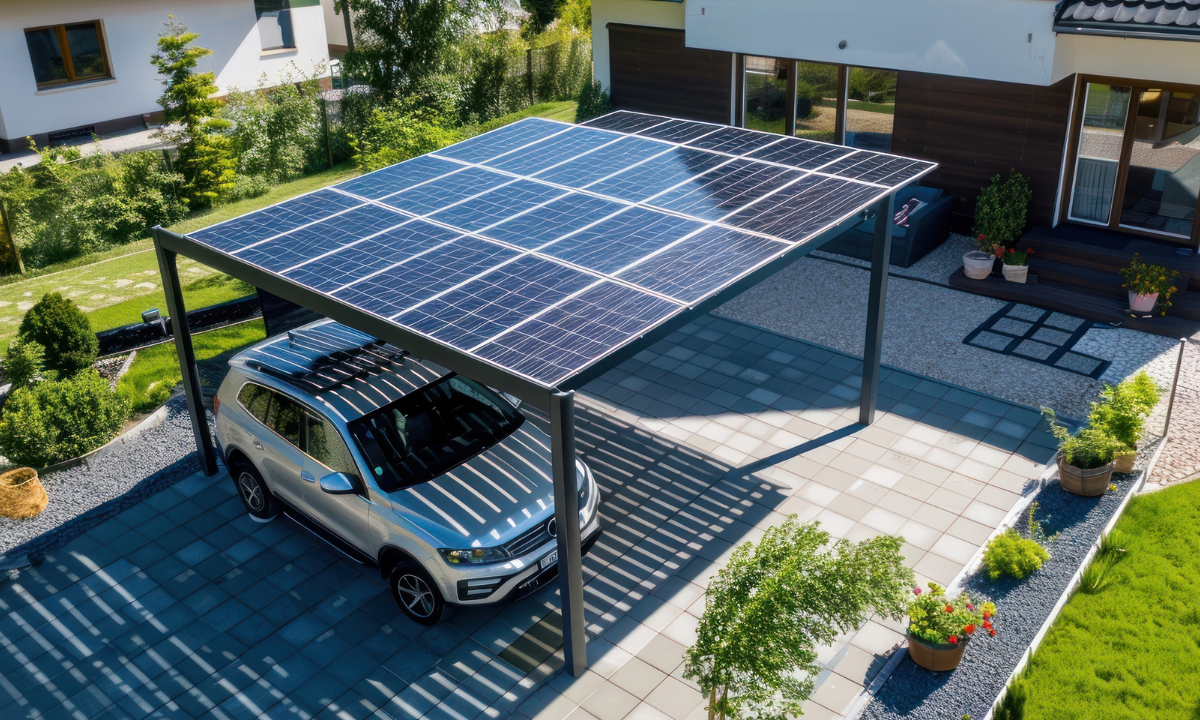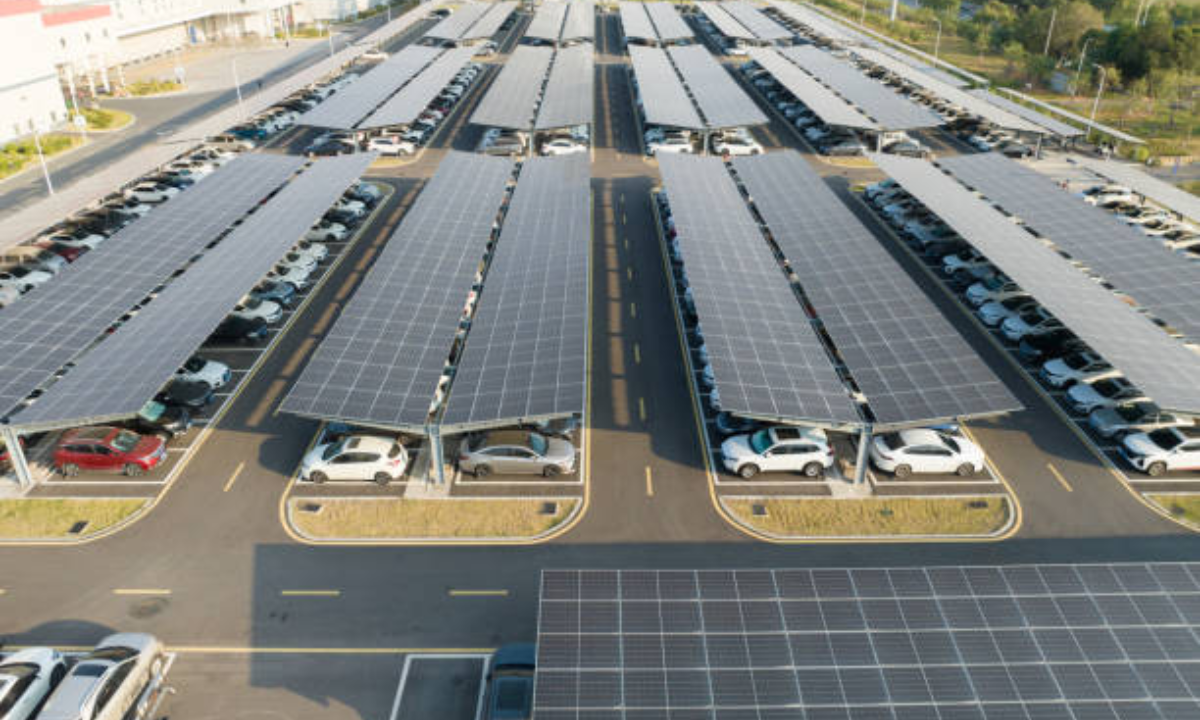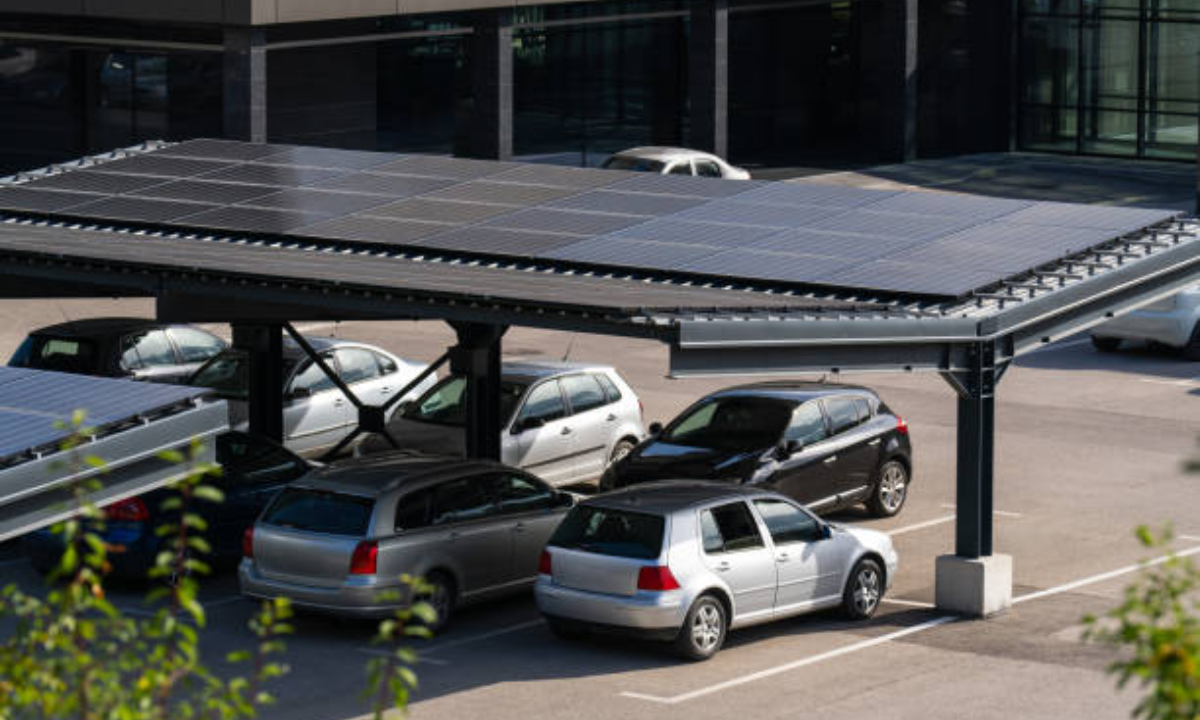Carports have evolved far beyond simple shelters for vehicles. Today, they are redefining how we combine clean energy, sustainable development, and modern design to protect our cars while contributing to a greener planet.
Before diving deeper, let’s understand the meaning of the carport. At their core, carports are covered structures designed to provide shade and protection for vehicles. But with the integration of solar technology, they are now becoming hubs of clean energy generation.
This fusion of practicality and sustainability is exactly why solar carports are gaining momentum across residential and commercial spaces worldwide. And here’s the exciting part: we are only scratching the surface of what they can do. Curious about how carports are shaping the future of energy and mobility? Let’s explore together.
Key Takeaways
- Understand the true meaning of carports and their evolution with solar technology.
- Learn about the benefits of residential solar carports and commercial solar carports.
- Explore the role of sustainable development in solar-powered mobility solutions.
- Discover how solar carport manufacturers in India and a solar EPC company in India are driving adoption.
Carports Meaning
Traditionally, carports were simple protective structures, often made of steel, wood, or aluminium, that kept vehicles safe from harsh sunlight, rain, or snow.
But as we move towards sustainable living, carports have been reimagined. Modern carports integrate solar panels, transforming them into solar carports that generate renewable energy while serving their original purpose of protection.
Why Solar Carports Are the Future

Solar carports combine utility with innovation. Imagine driving home, parking your car under a sleek structure, and knowing it’s not only protecting your vehicle but also producing electricity for your household or workplace.
This integration supports sustainable development, reduces dependency on fossil fuels, and makes clean energy adoption accessible to both urban and rural communities.
Example: A household with a residential solar carport can generate enough electricity to power their lights and fans and even charge an electric vehicle, cutting monthly energy bills significantly.
Residential Solar Carports: Power at Your Doorstep
For homeowners, residential solar carports are a game-changer. Unlike rooftop solar, which may face space or angle limitations, carports offer a flexible and efficient alternative.
Benefits include:
- Consistent energy generation with optimal panel positioning.
- Dual purpose: vehicle protection + clean energy.
- Adds property value and curb appeal.
- Ideal for charging electric vehicles at home.
Tip for Homeowners: If your roof is shaded or structurally weak, a residential solar carport can be a smarter investment than rooftop solar.
Commercial Solar Carports: Powering Businesses Sustainably

Businesses are also realizing the potential of commercial solar carports. From corporate campuses to shopping malls, these structures convert parking spaces into renewable energy assets.
| Advantages for Businesses | Impact |
|---|---|
| Reduced electricity bills | Lower operational costs |
| EV charging infrastructure | Attract eco-conscious customers & employees |
| Sustainability credentials | Enhanced brand reputation |
| Utilization of large parking areas | Converts unused space into energy hubs |
Example: A shopping mall installs a commercial solar carport. Not only do they reduce electricity bills, but they also provide EV charging stations, drawing in more customers who prefer green shopping destinations.
The Role of Solar Carport Manufacturers in India
India’s renewable energy sector is booming, and solar carport manufacturers in India are leading the change. They are designing cost-effective, durable, and customisable carport structures suitable for both homes and large-scale projects.
With the rising adoption of EVs and the government push for green infrastructure, local manufacturers are ensuring carports are not just an urban luxury but a nationwide sustainable solution.
Tip: When choosing a manufacturer, look for certifications, durability of materials, and efficiency of integrated solar panels.
Solar EPC Company in India: Driving Large-Scale Adoption
While manufacturers build the carports, a solar EPC company in India (Engineering, Procurement, and Construction) plays a vital role in executing large-scale solar carport projects.
These companies handle:
- Feasibility studies and site assessments.
- System design and engineering.
- Procurement of high-quality components.
- Complete project installation and maintenance.
Together, solar carport manufacturers and EPC companies ensure seamless execution from concept to completion.
How Carports Contribute to Sustainable Development
Carports directly align with the global sustainable development goals. They reduce carbon emissions, support renewable energy use, and prepare infrastructure for the rise of electric mobility.
By transforming parking spaces into energy hubs, they maximize land usage efficiency, something particularly valuable in densely populated countries like India.
Tips for Choosing the Right Solar Carport
- Assess your needs: residential or commercial?
- Check solar potential: ensure proper sunlight exposure.
- Evaluate durability: Look for high-grade materials resistant to weather.
- Partner with experts: Choose certified manufacturers and a reliable EPC company.
- Plan for EV future: Ensure your carport design supports EV charging.
FAQs About Carports
Q1: What is the difference between a regular carport and a solar carport?
A regular carport is simply a covered structure that shields vehicles from weather conditions like sun, rain, and snow. A solar carport, on the other hand, integrates solar panels into the roof structure. This allows it to generate renewable electricity while still protecting vehicles, making it a dual-purpose investment.
Q2: Can solar carports work during cloudy days?
Yes, solar carports still generate power on cloudy or rainy days, though the efficiency is lower compared to bright, sunny conditions. Modern solar panels are designed to capture diffused sunlight, ensuring steady output even in less-than-ideal weather. This makes them reliable year-round, especially in regions with mixed climates.
Q3: Are residential solar carports expensive?
The upfront cost of residential solar carports is higher than that of traditional carports, mainly because of the integrated solar technology. However, they quickly pay for themselves through electricity savings, government subsidies, and potential net metering benefits. In the long run, homeowners often see significant financial and environmental returns.
Q4: How long do solar carports last?
Solar carports are built with durable structures, typically using steel or aluminium frames, and the solar panels themselves have a lifespan of 20–25 years or more. With proper maintenance, both the structure and panels can serve reliably for decades. This makes them a sustainable and long-term solution for clean energy generation.
Q5: Do I need government approvals for installation?
Yes, in most cases, you will need permits and approvals before installing a solar carport. These approvals ensure the design meets local regulations, electrical codes, and safety standards. The good news is that experienced solar EPC companies usually handle the entire process, making it hassle-free for homeowners or businesses.
Conclusion
Carports are no longer just about protecting vehicles; they are about protecting our planet, too. From homes to businesses, their role in clean energy and sustainable development is undeniable.
As solar carports continue to rise in popularity, partnering with the right manufacturer and a reliable solar EPC company in India will be key to unlocking their full potential.
At Shobha Globs, these innovations are paving the way for a cleaner, smarter, and more sustainable future, one carport at a time.

